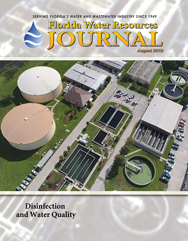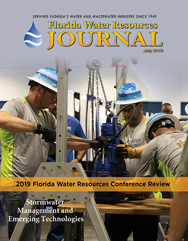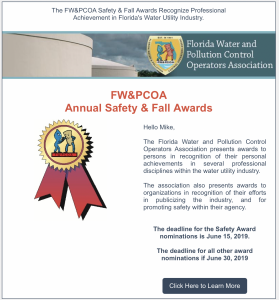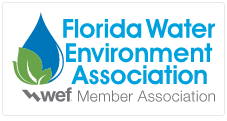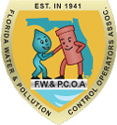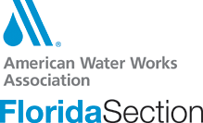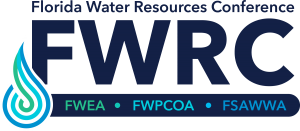Category Archives: Current News
The Water Research Foundation Announces New RFPs for 12 Research Projects
(Alexandria, VA) July 9, 2019 – The Water Research Foundation (WRF) has announced that Requests for Proposals (RFPs) are available for 12 new research projects. The RFPs are as follows:
Occurrence of PFAS Compounds in U.S. Wastewater Treatment Plants (5031)
Due Date: September 12, 2019 by 2:00 PM MT
Analysis of Corrosion Control Treatment for Lead and Copper Control (5032)
Due Date: September 12, 2019 by 2:00 PM MT
Demonstrating the Effectiveness of Flushing for Reducing the Levels of Legionella in Service Lines and Premise Plumbing (5033)
Due Date: September 24, 2019 by 2:00 PM MT
Assessing the Microbial Risks and Potential Impacts from Stormwater Collection and Uses to Establish Appropriate Best Management Practices (5034)
Due Date: September 24, 2019 by 2:00 PM MT
Impact of Bromate Control Measures on Ozone Oxidation/Disinfection and Downstream Treatment Processes in Potable Reuse (5035)
Due Date: September 24, 2019 by 2:00 PM MT
Technical Brief: Compounds of Current and Future Interest and Implications for One Water (5036)
Due Date: September 24, 2019 by 2:00 PM MT
Evaluation of Existing Source Separate Organic Feedstock Pre-Treatment and Management Practices (5037)
Due Date: September 24, 2019 by 2:00 PM MT
2019 Roadmap Workshop on Prioritizing Permitting and Linkages Research in Water Quality (5038)
Due Date: September 12, 2019 by 2:00 PM MT
Definition of Smart Utility – How to be a Digital Utility and the Framework for an Intelligent Water System (5039)
Due Date: September 12, 2019 by 2:00 PM MT
Successful Implementation of Decentralized Reuse and Treatment Systems (5040)
Due Date: September 12, 2019 by 2:00 PM MT
Guidelines for Optimizing Nutrient Removal Plant Performance (4973)
Due Date: September 12, 2019 by 2:00 PM MT
Potable Reuse Demonstration Design & Reuse Communication Toolbox (4979)
Due Date: September 24, 2019 by 2:00 PM MT
This is WRF’s strategic research program, which enables us to address broadly relevant subscriber issues, challenges, and opportunities with targeted research that lasts for a period of three to five years. Specific questions about these RFPs should be directed to the WRF staff contact included on each RFP. Proposals submitted in response to these RFPs must follow WRF’s Guidelines for Research Priority Program Proposals.
Practical Framework for Water Infrastructure Resilience (RFP 5014)
(Alexandria, VA) May 20, 2019 — The Water Research Foundation (WRF) announced that a Request for Proposals (RFP) is available for a new research project funded under the Foundation’s Emerging Opportunities Program. This project will develop a practical framework for utilities that operate drinking water, wastewater, and stormwater systems to use as a tool to develop resilience plans for their infrastructure, to help meet America’s Water Infrastructure Act (AWIA) requirements, and to achieve the ultimate goal of increasing water infrastructure resilience.
In the water sector, resilience focuses on protecting human health, property, and the environment by minimizing drinking water and wastewater service outages, flood protection, and recovery of all systems as soon as possible following a disruption. As such, each utility’s risk-management priorities depend on many factors, including utility size, location, assets, and perhaps most importantly, the resources and capabilities a utility can access. According to a Water Research Foundation project, Resilient Water Infrastructure: Improving Understanding and Assessing Needs (4707), “there is no agreed definition of, or approach to, resilience across the sector” and “no consensus as to whether the development of a ‘standard’ definition would be helpful.” Long-term threats to water infrastructure including infrequent/uncertain hazards and extreme weather events, limited funding and flexibility, and deteriorating infrastructure complicate the water sector’s resilience planning efforts.
To accomplish the goals of this project, the researcher will review and synthesize recent related literature and deconstruct water utilities’ experiences of recent disaster events, e.g., earthquake, wild fire, flooding, etc., and provide insights and suggestions for a practical framework for water utilities, including drinking water, wastewater, and stormwater utilities, to use in developing infrastructure resilience plans. Additionally, the research effort will include a workshop for utilities to share project findings and experiences, provide insights, and identify gaps on infrastructure resilience, in particular those related to the AWIA requirements, including challenges, advancements, and lessons learned.
WRF will form a Project Advisory Committee (PAC) composed of volunteer professionals with expertise in the research subject area to oversee the project funded through this solicitation. Proposals will be reviewed by WRF staff and the PAC against established evaluation criteria. WRF may request additional information from the researcher based on this review, and interviews may be conducted for the top three proposals.
Proposals should be submitted to EOpportunities@waterrf.org by 3 pm MT on Tuesday, June 18th, 2019. For proposal submittal questions, contact Caroline Bruck, Senior Administrative Assistant, at cbruck@WaterRF.org (303-347-6118). For technical questions about the RFP, contact Jian Zhang at jzhang@waterrf.org (303-347-6114).
More information on the RFP is available here.

